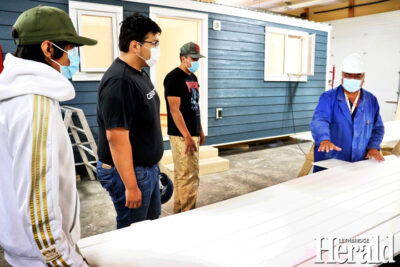Trades course helping Blood Tribe students acquire skills to succeed
By Herald on July 13, 2021.
 Roy Sugai, far right, instructs Zeb Manyfingers, Kyzer Bird and Terence Many Grey Horses in a construction course being taught at the Blood Tribe Employent and Skills Training Centre in Levern.
Herald photo by Al Beeber
Roy Sugai, far right, instructs Zeb Manyfingers, Kyzer Bird and Terence Many Grey Horses in a construction course being taught at the Blood Tribe Employent and Skills Training Centre in Levern.
Herald photo by Al BeeberAl Beeber – Lethbridge Herald
A collaborative effort between Lethbridge College and Blood Tribe Employment and Skills Training is giving students on the reserve skills to make a living in the trades.
Taught by Roy Sugai at BTEST in Levern, the course teaches a wide range of skills to students including carpentry, electrical, plumbing, drywall and life skills.
Since the course’s inception, Sugai has seen many students go on to careers in carpentry and he’s hoping the endeavour will help make the Blood Reserve a must-go place for contractors looking for talented, well-trained employees.
A pilot project undertaken this year by Sugai’s class of 10 is a tiny home, which will soon be given to a Blood Tribe Elder.
The home’s construction provides on-the-job learning for Sugai’s students who have built the home from the ground up, using the skills they have learned.
Two of those 10 students have already left after securing work.
The one-bedroom home is 249.43 square feet in size and measures 9X6X30 feet. It features a bedroom, a combined living room/kitchen, full-sized bathroom and space for a furnace as well as an upright washer/dryer combination. In the bedroom is a trap door that will lead down to a four-foot crawl space.
The home is also being equipped with solar power.
In their time in the course, Sugai’s students learn 1st year to fourth-year carpentry skills. Students are also provided with tools so when they leave to begin their careers, they have the equipment at hand they will need to work.
Both men and women have taken the course including a mother of five who “has done very well, said Sharon Prasloski, Sugai’s assistant who helps teach the lifeskills courses.
“Women have really benefited from the program,” said Sugai, with some going onto supervisory positions afterwards.
The tiny home construction has taken about 20 weeks.
Sugai learned his own skills from his late father, who built campers and truck toppers in Raymond. From his father, he also learned his work ethic and still often puts in seven-day work weeks.
“The students get to learn hands-on first-year to fourth-year carpentry. The students did a little bit of electrical, they wired the house, and they plumbed the house,” said Sugai Tuesday.
The electrical component is taught by an instructor who is brought in for that purpose.
“It makes it easier for a student who takes this course to get into the trades or get onto a job site. Now you’ve got this kind of training and you get all your tools to go to work.”
The students are also taught how to get a job and fill out applications.
“It’s a good project if you want to get in the trades and you’ve got no skills. A lot of people I teach are at poverty level and they can’t afford to go to school. This is an opportunity to better yourself and get out into the working world and contribute to society,” he said.
“A lot of students who have taken the course have gone on and are still in the trades. I’ve taught over 200 students here at BTEST already.”
The course is called Introduction to the Trades and it’s run out of the BTEST training centre in Levern, which teaches a wide range of courses.
“We teach how to build a house right from beginning to end which includes drywall, mudding, siding, roofing, and placing cabinets, and helping put the plumbing and electrical in,” he said.
Students also learn framing, insulating and sheeting skills.
“Basically all the skills I learned from my dad I brought to this course and it works, like being a good worker, being on time, putting overtime in if you have to, learning the skills to be a versatile trades person. You need all these skills in today’s society to go anywhere. You can’t do one thing anymore; you have to be versatile.
“Now you’ve got all this knowledge and background behind you,” he said.
“We’re trying to turn the reserve around and make it a place where contractors can call for skilled labour. Right now I get quite a few contractors from all over Alberta calling for carpenters because there’s such a shortage now. And even on the reserve, there’s such a shortage,” he said.
“There’s jobs happening on the reserve where we can put our own people to work with a little bit of training.”
Students will leave the course with five tickets, said Sugai, “plus a chance to be an apprentice carpenter because now you’ve got hours in to become an apprentice.”
Previously, students were doing basic woodwork including building cabinets, coffee tables, picnic tables and benches.
“We taught a variety of skills, like woodworking skills and knowledge of power tools and hand tools. So basically all that stuff we did growing up, I’m teaching here.”
Follow @albeebHerald on Twitter.
32-31




